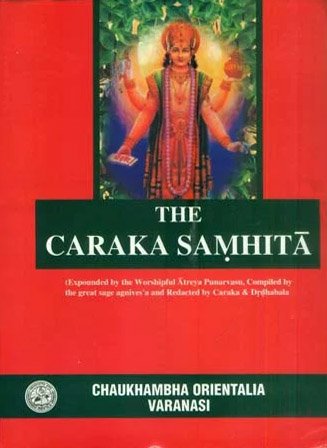History of Indian Medicine (and Ayurveda)
by Shree Gulabkunverba Ayurvedic Society | 1949 | 162,724 words | ISBN-13: 9788176370813
The History of Indian medicine and Ayurveda (i.e., the science of life) represents the introductory pages of the Charaka Samhita composed of six large sections dealing with every facet of Medicine in ancient India in a Socio-Historical context. Caraka is regarded as one of the pioneers in the field of scientific healthcare. As an important final a...
Chapter 7 - The Qualities required in the Student for Admission to Medical Studies
Taking into full view the various qualities depicted as being the requirements for a student for admission into the medical institution, we find that the physical, moral and intellectual aspects of the student were comprehended by the list of virtues mentioned therein. It is evident from this that the greatest stress was laid on the moral make-up of the medical aspirant. But the intellectual and physical qualities though only next to it, were not only not neglected but [?? demanded?] a high standard. They insisted that the physical appearance must not offend the aesthetic sense of general humanity and specially in view of the impression that the medical man nas to make on the patient. Hence the general traits, features and complexion were required to be pleasant and the speech to be clear and distinct. As regards the moral qualities insisted upon, they were very high
As regards the intellectual qualities, they have maintained a very high and strict standard in the entrance examination, two out of every five candidates were successful to get admission
We shall here mention some of the salient qualities described as constituting the eligibility of a student for medical studies according to the text of Caraka, Sushruta, Vagbhata and Kashyapa.
Praśānta—Possessed of tranquil disposition;
Āryaprakṛti—Possessed of gentlemanliness;
Akṣudrakarman—Possessed of nobility;
Ṛjucakṣurmukhanāsa—Straight of eye, mouth and nose;
Tanuraktaviśadajihva—With thin, ruddy and clear tongue;
Avikṛta-dantoṣṭha—With seemly teeth and lips;
Aminmina—With no defect of speech;
Bhṛtimān?—Endowed with retention;
Anahaṅkṛta—Free from egotism;
Medhāvī—Intelligent;
Vitarkasmṛti-sampunna?—Endowed with reason and memory;
Udārasattva—Endowed with large-mindedness;
Tadvidyrakulaja?—Possessing a lineage devoted to the science;
Tatvidyavṛtta—Showing inclination for medical science;
Tattvābhiniveśī—Possessing a predilection for philosophy;
Avyaṅga—Being whole of body;
Avyāpannendriya—Unimpaired in senses;
Nimṛta—Being collected of mind;
Anudvatavepa?—Not given to showy appearance;
Avyapanī—Not given to addictions;
Aryatattva-bhāvaka—Possessed of deep insight into things;
Akopana—Not irritable;
Śīla-śaucācāra-anuraga-dākṣya-prādakṣiṇya-upapanna—Possessed of character, purity, conduct, affection, skill and compliance;
Avyayanābhikāma—Having passion for study;
Arthavijñāna, Karmadarśana, Ananyakārya?—Being undistracted of mind in understanding the sense and observing the practical demonstration of the science;
Alubdha—Free from greed;
Analasa—Free from procrastination;
Sarvabhūta-hitaipī?—Wishing the welfare of all creatures;
Ācārya-sarva-anuśiṣṭi-pratiprattikara?—Implicitly obedient to the teacher;
Anurakta—Affectionate;
Anvaya-vaya-śaurya-vinaya-śakti-bala-pratipatti-yukta?—Possessed of proper lineage, age, spirit, humility, strength, vitality and knowledge;
Tanda-uṣṭa-dantagra?—Delicate of lips and teeth ;
Prasanna-citavākceṣṭa—Tranquil of mind, speech and behaviour;
Kleśasaha—Possessed of endurance;
Gurubhakta—Devoted to the teacher;
Abhiyukta—Attached to the teacher;
Pāṭavaiḥ atiyuktaḥ—Possessed of cleverness in various subjects;
Tanunakha—Possessing thin nails;
Snigdhacchavi—Unctuous in complexion;
Tanuchavi—Having delicate lustre;
Brahmacārī—Devoted to celibacy;
Jitadvandva—Possessed of indifference to pain and pleasure;
Dhīra—Wise;
Sucarita—Good in conduct;
Sthira—Having stability of mind;
Śukla—Possessed of purity of mind;
Lajjayānvita?—Endowed with shyness;
Śaucakulānbita?—Possessed of clean habits and good lineage;
Śānta—Possessed of patience;
Dakṣiṇa–Compliant;
Anukla?—Submissive;
Kule janma—High birth;
Yathoktakārī—Prompt in the execution of the teacher’s behests;
Anutmeka—Free from arrogance;
Īrṣyā-vivarjita—Free from envy;
Smṛtimāna—Possessed of memory;
Satyavān—Truthful;
Dṛḍhavrata—Possessed of determination;
Sadājñā-paripālaka—Carrying out the behests of the good;
Dambha-mātsarya-nirmukta—Free from bluster and envy;
